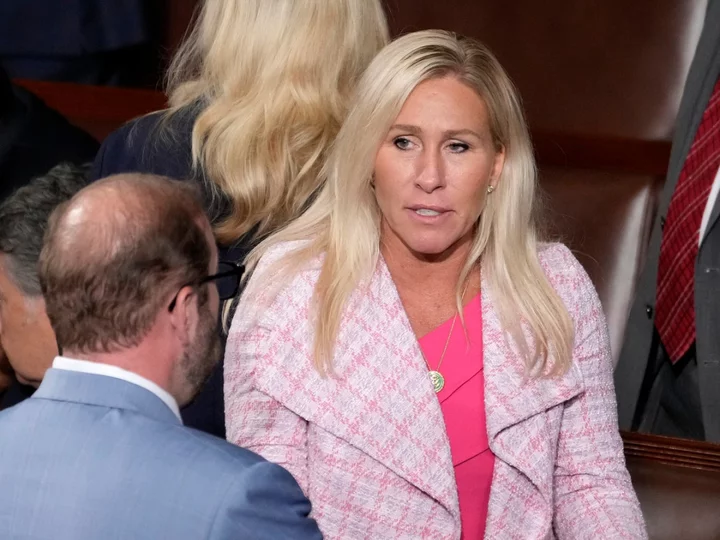
More than half of Americans have experienced online hate and harassment, report finds
More than half of all Americans have experienced online hate or harassment within their lifetimes, while reports of online abuse among teenagers and LGBT+ people have surged within the last year, according to an annual survey from a leading civil rights group. The Anti-Defamation League’s fifth annual survey charts a dramatic increase in reports of online hate and harassment among several groups over the last year, including 51 per cent of teenagers between ages 13 and 17 – an increase of 15 per cent from the same point last year. Forty-seven per cent of LGBT+ people, 38 per cent of Black people, and 38 per cent of Muslims have reported online hate and harassment over the last 12 months, according to the report, which calls on Congress, the White House and social media companies to implement stronger protections against online abuse. “We’re confronted with record levels of hate across the internet, hate that too often turns into real violence and danger in our communities,” according to a statement from ADL CEO Jonathan Greenblatt. “The time for talking, and for planning, is long over. It’s time to execute on the priorities set out by the White House and other policymakers, and it’s time for big tech companies to deliver on their promises to reduce hate online.” Reports of online abuse are particularly acute among transgender people; 76 per cent of trans respondents said they have been harassed online within their lifetimes, and more than half experienced such abuse within the previous 12 months – the most among any demographic included in the survey. “Due to the recent proliferation of extreme anti-transgender legislation and rhetoric, ADL sampled transgender individuals separately this year,” according to the report. By the end of May, state lawmakers had introduced more than 500 bills impacting LGBT+ people in 2023, including 220 bills specifically targeting trans and nonbinary Americans, according to an analysis from the Human Rights Campaign. In remarks at the White House earlier this month, President Joe Biden condemned the “totally, thoroughly unjustified and ugly” wave of legislation impacting LGBT+ Americans. A separate report from the ADL and GLAAD discovered more than 350 targeted threats against LGBT+ people within the last year, including online harassment as well as armed protests at drag performances, bomb scares against hospitals that provide gender-affirming healthcare, and other acts of violence, including a mass shooting inside a Colorado Springs LGBT+ nightclub. Incidents targeting drag performers and the people and venues that host them have accelerated across the US, with similar threats surfacing in the UK, according to a separate recent report from the Institute for Strategic Dialogue. The group collected 203 on- and offline threatening incidents within the last year. The ADL’s latest survey of 2,139 people was performed online with the ADL and YouGov from 7 March through 24 March. Read More More than 200 anti-drag attacks documented across US as nation leads global threats to LGBT+ events Ritchie Torres, the only openly gay Black man in Congress, on how he fights GOP ‘bullying’ of LGBT+ people Elon Musk promotes transphobic content as hate speech surges on his far-right platform White House rejects Lauren Boebert’s claim that antisemitism plan will be used ‘go after conservatives’
2023-06-29 00:55

Cambodian leader Hun Sen, a huge Facebook fan, says he is jumping ship to Telegram
Cambodian Prime Minister Hun Sen, a devoted and very active user of Facebook — on which he has posted everything from photos of his grandchildren to threats against his political enemies — said Wednesday that he will no longer upload to the platform and will instead depend on the Telegram app to get his message across. Telegram is a popular messaging app that also has a blogging tool called “channels.” In Russia and some of the neighboring countries, it is actively used both by government officials and opposition activists for communicating with mass audiences. Telegram played an important role in coordinating unprecedented anti-government protests in Belarus in 2020, and currently serves as a major source of news about Russia’s war in Ukraine. The 70-year-old year Hun Sen is listed as having 14 million Facebook followers, though critics have suggested a large number are merely “ghost” accounts purchased in bulk from so-called “click farms,” an assertion the long-serving prime minister has repeatedly denied. The Facebook accounts of Joe Biden and Donald Trump by comparison boast 11 million and 34 million followers, respectively, though the United States has about 20 times the population of Cambodia. Hun Sen officially launched his Facebook page on Sept. 20, 2015, after his fierce political rival, opposition leader Sam Rainsy, effectively demonstrated how it could be used to mobilize support. Hun Sen is noted as a canny and sometimes ruthless politician, and has since then managed to drive his rival into exile and neutralize all his challengers, even though Cambodia is a nominally democratic state. Hun Sen said he is giving up Facebook for Telegram because he believes the latter is more effective for communicating. In a Telegram post on Wednesday he said it will be easier for him to get his message out when he is traveling in other countries that officially ban Facebook use. China, the top ally of his government, is also the biggest country with a Facebook ban. Hun Sen has 855,000 followers so far on Telegram, where he appears to have started posting in mid-May. It is also possible that Hun Sen’s social media loyalty switch has to do with controversy over remarks he posted earlier this year on Facebook that in theory could see him get at least temporarily banned from the platform. As the country’s top leader for 38 years, he has earned a reputation for heated rhetoric, and in January, speaking at a road construction ceremony, he decried opposition politicians who accused his ruling Cambodian People’s Paty of stealing votes. “There are only two options. One is to use legal means and the other is to use a stick,” the prime minister said. “Either you face legal action in court, or I rally (the Cambodian) People’s Party people for a demonstration and beat you up.” His remarks were spoken on Facebook Live and kept online as a video. Perhaps because of heightened consciousness about the power of social media to inflame and trigger violence in such countries as India and Myanmar, and because the remarks were made ahead of a general election in Cambodia this July, complaints about his words were lodged with Facebook’s parent company, Meta. Facebook’s moderators declined to recommend action against Hun Sen, judging that his position as a national leader made his remarks newsworthy and therefore not subject to punishment despite their provocative nature. However, the case was forwarded in March to Meta’s Oversight Board, a group of independent experts that is empowered to render an overriding judgment that could limit Hun Sen’s Facebook activities. They may issue a decision in the next few weeks. The case is being closely watched as an indicator of where Facebook will draw the line in countries with volatile political situations. Hun Sen said his Facebook account will remain online but he will no longer actively post to it. He urged people looking for news from him to check YouTube and his Instagram account as well as Telegram, and said he has ordered his office to establish a TikTok account to allow him to communicate with his country’s youth.. ___ Peck reported from Bangkok. Dasha Litvinova contributed from Tallinn, Estonia. Read More Ukraine war’s heaviest fight rages in east - follow live Charity boss speaks out over ‘traumatic’ encounter with royal aide Cambodian lawmakers approve changes to election law that disqualify candidates who don't vote Trump’s latest defence in the classified documents case: ‘Bravado’ Trump gives ‘bravado’ defence for secret papers tape as he sues E Jean Carroll – live
2023-06-29 00:54

LOCALIZE IT: Biden announced billions of dollars to expand broadband. What's next?
EDITORS/NEWS DIRECTORS: The Biden Administration released details about the $42.5 billion cornerstone of its Internet for All initiative on Monday. The money, which state governments will eventually award broadband providers, has the chance to be transformative in communities with inadequate service or exorbitant costs. Funding amounts from the Broadband Equity, Access and Deployment (BEAD) program depended primarily on the number of unserved locations in each jurisdiction. Unserved locations are those that lack access to internet download speeds of at least 25 megabits per second download and upload speeds of 3 Mbps. Download speeds involve retrieving information from the internet, including streaming movies and TV. Upload speeds determine how fast information travels from a computer to the internet, like sending emails or publishing photos online. The federal government used the FCC’s National Broadband Map to identify the number of unserved locations in each jurisdiction. Before states can draw down on those funds, they must engage in a multi-step approval process with the federal government to ensure the money is deployed to the communities that need it the most. ___ AP’S LATEST COVERAGE Biden’s broadband plan aims to connect every home and business in U.S. by 2030. What’s next? High-speed internet is a necessity, President Biden says, pledging all US will have access by 2030 ___ VIEW YOUR STATE'S BEAD FUNDING ALLOTMENT AND PERCENT OF AREAS UNSERVED — The AP produced a dataset showing each state’s allotment in dollars and the percent of Broadband Serviceable Locations—homes and businesses where high-speed internet could be installed—that are estimated to be unserved, according to the latest version of the FCC National Broadband Map. ___ VIEW DETAILED BROADBAND MAPS AND FUNDING MAPS — The FCC National Broadband Map is an updating dataset that shows advertised internet speeds at the address level. Version 2 is the latest public iteration and was used to determine states’ BEAD allotments. The default view of the map shows residential service provided by all types of technology with download speeds of at least 25 Mbps and upload speeds of at least 3 Mbps. The federal government defines reliable service as that which is provided through wired or fixed wireless technologies. To view coverage provided by reliable technologies only, click the gear icon on the righthand side of the page. Under technologies, select “All Wired and Licensed Fixed Wireless.” In this menu, you can also choose to view coverage of businesses instead of residences and set different speed minimums. — Check out the FCC Broadband Funding map. This offers details on funding from some other federal broadband expansion programs. To view a breakdown of projects and funding in a given area, click the Funding Summary button (to drill down, make sure you're zoomed in to at least level 10, then click on individual hexagons for details). To view the percentage of areas unserved or unfunded, click the Location Summary button. To view maps by funding type, click on the different links below the Broadband Funding Summaries heading in the pop-up box. ___ VIEW OTHER RESOURCES — The National Telecommunications and Information Administration (NTIA) is administering the BEAD program. It is keeping track of which states have released initial proposals, which must be approved before states can begin the grant making process. Initial proposals are due by the end of the year and can be submitted in two volumes. On this page are also links to 5-year-plans, which lay out how states hope to achieve universal connectivity, and digital equity plans, covering how states aim to equip individuals with the skills and devices necessary to leverage internet access. You can sign up to receive email updates when new proposals and plans are released. States with initial proposals released: Louisiana (volume 1) Virginia (volume 1) States with 5-year plans released: Hawaii Maine Montana Ohio Utah Draft Digital Equity Plans: Louisiana Maine Montana Utah — Nonprofits, internet service providers and local and Tribal governments will eventually have the opportunity to assess their state’s determinations of which locations are eligible for funding and challenge those decisions. The NTIA has published draft guidance for how those challenge processes will run, and final guidance is expected soon. ___ QUESTIONS/REPORTING THREADS — What is your state’s allotment from BEAD? How have state and local officials reacted to this amount? Do they believe it will be enough to connect people who are still without access to reliable internet? — Which counties in your state are the most digitally distressed? Are there any demographic or socioeconomic similarities between these areas? Are they geographically consolidated or spread throughout the state? Do any counties with poor connectivity border counties that have good internet access? — Are there any topographic or climatic challenges, such as mountains and year-round cold weather, to laying down fiber in your state? How do state officials plan to overcome these challenges? Are there any remote counties or towns? — What is the landscape of existing broadband aid in your state? Broadband expansion projects from other federal programs, including the USDA’s ReConnect program and the American Rescue Plan, are ongoing. Additionally, states run their own grant programs aimed at closing the digital divide. How are these projects going? How have completed projects affected the lives of people in that area? How do these existing projects work with your state's plans to use BEAD funding? ___ READ ADDITIONAL AP COVERAGE $930 million in grants announced in Biden’s effort to expand internet access to every home in the US States contend with short timeline to correct broadband map ___ Localize It is an occasional feature produced by The Associated Press for its customers’ use. Questions can be directed to Katie Oyan at koyan@ap.org. Read More Ukraine war’s heaviest fight rages in east - follow live Charity boss speaks out over ‘traumatic’ encounter with royal aide UN urges Israel and Palestinians to halt West Bank violence in statement backed by US and Russia EPA retreats on Louisiana investigations that alleged Blacks lived amid higher cancer risk US push to lower wildfire risk across the West stumbles in places
2023-06-28 23:50

Marjorie Taylor Greene mocked for bizarre tweet boasting about good health and claiming her TV is spying on her
Georgia Republican Marjorie Taylor Greene posted a lengthy tweet bragging about her health and exercise regimen after claiming that her TV in her DC residence appears to be spying on her. On Sunday morning, Ms Greene wrote: “Last night in my DC residence, the television turned on by itself and the screen showed someone’s laptop trying to connect to the TV.” “Just for the record: I’m very happy. I’m also very healthy and eat well and exercise a lot. I don’t smoke and never have. I don’t take any medications. I am not vaccinated. So I’m not concerned about blood clots, heart conditions, strokes, or anything else. Nor do I have anything to hide,” Ms Greene added, possibly in a reference to the novel 1984, where residents are spied on by the state via their TVs. “I just love my country and the people and know how much they’ve been screwed over by the corrupt people in our government and I’m not willing to be quiet about it, or willing to go along with it,” she concluded, before adding a link to a CBS News story about Smart TVs possibly spying on their users, according to the FBI. The agency issued a warning in late 2019 saying that Smart TVs could be hacked and access could be gained to a home’s computer network. The FBI noted that while Smart TVs are connected to the Internet, they’re often much less secure than computers and smartphones. This means that cybercriminals may use the TVs to access home routers, TechCrunch noted at the time. “Beyond the risk that your TV manufacturer and app developers may be listening and watching you, that television can also be a gateway for hackers to come into your home,” the FBI warning said at the time. Ms Greene was quickly mocked by Twitter users for seemingly suggesting that the government was spying on her via her TV. “Yeah every time someone tries to access my WiFi I know that means they’re coming to kill me,” historian Kevin Kruse tweeted. “Was the deep state trying to watch your tv shows?” Josh Marshall of Talking Points Memo tweeted. “Am I the only one who doesn’t know what the tv screen looks like when it shows ‘someone’s laptop trying to connect to the TV.’ I wanted to be prepared for when I have my first psychotic break.” “It happens all the time in apt buildings. Someone chooses the wrong tv. You say deny and move on,” Greg Gadren responded. “Do people not know about smart tvs? I’ve accidentally tried to connect to other people’s tv in my apartment complex. It doesn’t mean I’m trying to spy, nor does it mean anything weird is happening,” one account holder said. “You should IMPEACH THE TV,” one Twitter user said. “What is apple play for $200.” “Have you considered an exorcism?” another account holder said. “Are they in the room with us right now?” California Democrat Eric Swalwell joked. “I feel like a neighbor accidentally trying to Airplay to your TV isn’t an assassination attempt?” Hayden Clarkin said. “I am laughing so f****** hard. A neighbor trying to screen share something accidentally clicked ‘Samsung-8237’ instead of ‘Samsung-1490’ and this delusional nut job is issuing a final will and testament,” Caleb Hearon said. Read More Speaker McCarthy supports expunging Trump's impeachments over Ukraine and Jan. 6 Arizona election denier Kari Lake ‘couch-surfing like a bum’ at Mar-a-Lago, ex-Trump lawyer says Lauren Boebert reveals she’s officially a grandmother as she avoids question about Marjorie Taylor Greene spat Trump allies in Congress seek to expunge impeachments Lauren Boebert reveals she’s officially a grandmother at age 36 Marjorie Taylor Greene calls Lauren Boebert a ‘little b****’ on House floor
2023-06-26 21:53

Online gamblers raked in thousands on bets against the Titanic sub crew’s survival
Online gamblers bet hundreds of thousands of dollars on whether the submarine that went missing on a recent expedition to the Titanic, in what online critics called a “dystopian” use of digital finance. Since Wednesday, people wagered at least $300,000 on the fate of the vehicle using the crypto platform Polymarket, Mother Jones reports. On the site, betters buy and sell shares on the outcomes of events using cryptocurrency, and can redeem their shares for $1 each if their guesses are correct. Follow the latest updates on the missing Titanic submarine here “For the purposes of this market, the vessel need not have been rescued or physically recovered to be considered ‘found,’” reads the description page for the submarine bets. “If pieces are located, but not the cabin which contains the vessel’s passengers, that will not suffice for this market to resolve to ‘Yes.’” One user, asking only to be identified by his first name, Rich, told Mother Jones he made around $3,250 betting. He argued what he was doing was morally defensible because unlike the regular stock market, it had no impact on the fate of the entity being wagered upon. “My answer would be that markets are fundamentally immoral. There’s no ethical consumption under capitalism,” Rich said. Others weren’t so sure. Social media users racked up thousands of likes criticising such gamblers. “Actually insane,” one commenter wrote. “Imagine making money off of if someone is gonna die or not.” Polymarket defended its offerings on the submarine, arguing that it was a neutral way of calculating the likelihood of a rescue. “If the families were privy to Polymarket, they could use the market as a way to obtain the real-time, unbiased probability of the submarine being recovered,” the company said in an email to Gizmodo. “That is a far more valuable service to them than sensationalist media coverage: with our markets at least they understand the true probabilities.” Bookmakers take bets on nearly everything, from sports to sex tapes, but the industry does have some lines regarding poor taste. According to Betting Gods, a gambling industry tip site, most major bookmakers refused to take bets regarding the death of Queen Elizabeth. “Major bookmakers won’t bet on the Queen dying as it would offend most of its regular customers. Whether they all agree with Britain having a royal family or not, most people would prefer to bet on a variety of other things such as sports,” the site wrote in an article. “When asked the question of why bookmakers won’t bet on what age the queen will die, the spokespeople of all the major bookmakers were unanimous in saying that it was important that people understand where the parameters of bad taste bets can’t be crossed.” Read More US launches prosecutions of Chinese companies on charges of trafficking fentanyl ingredients Titanic sub latest - Coast Guard makes stunning admission about ‘explosion’ when submersible lost contact OceanGate CEO said he was ‘personally insulted’ by ‘baseless cries’ about Titanic sub’s deadly safety flaws Federal court halts ‘suppressive’ Florida drag ban Florida's law targeting drag shows is on hold under federal judge's order Recovery could cost millions as Coast Guard stunningly admits submersible ‘explosion’
2023-06-24 07:46

Elon Musk sparks outrage with threat to ban ‘cisgender’ as a ‘slur’ on Twitter
Twitter CEO Elon Musk has apparently decided that "cis" and "cisgender" will now be considered a slur on the social media platform. "Cisgender" typically refers to individuals whose gender identity matches their birth sex. If an individual is born male and has a male gender identity then they would be considered "cisgender." The proclamation was made in the replies of James Esses, an Irish right-wing media figure, who was complaining that commenters on social media were calling him a "cissy." "Yesterday, after posting a Tweet saying that I reject the word ‘cis’ and don’t wish to be called it, I receive a slew of messages from trans activists calling me ‘cissy’ and telling me that I am ‘cis’ 'whether or not I like it,'" he wrote. "Just imagine if the roles were reversed." Mr Musk responded with an announcement that "repeated, targeted harassment against any account will cause the harassing accounts to receive, at minimum, temporary suspensions." Mr Musk then took it a step further. "The words 'cis' or 'cisgender' are considered slurs on this platform," he wrote, prompting backlash on the platform. NYT bestselling author Seth Abramson doubted that Mr Musk knows what the word means. “I’m 102.3% sure Elon has no idea what ‘cis’ or ‘cisgender’ mean, either connotatively or denotatively or etymologically,” he wrote. “Threatening to suspend users on your ‘free speech’ platform because they uttered a word you don’t understand but fear emasculates you is quite the fascist flex.” Joe Walsh, a conservative commentator, criticised Mr Musk from the right. “‘Cis’ & ‘cisgender’ will be considered slurs on this platform? Look, it’s his company, he can do whatever he wants, but the truth is that @elonmusk is fundamentally a dishonest person and a coward,” Mr Walsh wrote. “He says he believes in free speech, but he doesn’t really believe in free speech. He’s pushing an agenda, a right wing agenda, but he doesn’t have the balls to admit that. Elon is too afraid to be honest with his intentions. So he lies and says he’s for free speech. But you can’t say ‘cisgender.’ No, Elon is just like most everyone else. He’s pushing an agenda. He just lacks the honesty & the courage to admit it.” It’s not the first time Mr Musk has expressed his disdain for language relating to gender identity. Last July he tweeted that “pronouns suck” — suggesting he either dislikes gender identity or just the English language in general — and later that year insisted that he was not transpohobic. “I absolutely support trans, but all these pronouns are an aesthetic nightmare,” Mr Musk, creator of the Cybertruck, argued. However, in defending his dislike of “cis” and “cisgender,” Mr Musk leaned on a decades old bigoted ideas that LGBT communities and ideas are deeply infected with pedophilia. “The contemptible creep that manufactured the term ‘cis’ has serious problems. Ignore him,” Mr Musk wrote, referencing a right-wing conspiracy theory that the term “cisgender” was coined by a paedophile doctor in the 1990s. However, cis— with “cis” being the Latin opposite to “trans” — has been used as a dichotomic descriptor since at least the early 20th century. Read More Musk vows to bring Tesla to India ‘as soon as possible’ after meeting Modi Elon Musk stays mum on Titanic submarine disappearance despite Starlink connection Elon Musk and Joe Rogan challenge Covid vaccine scientist to ‘debate’ anti-vaxxer Robert F Kennedy Jr Elon Musk stays mum on Titanic submarine disappearance despite Starlink connection India’s Modi to meet Elon Musk during US state visit Vaccine scientist hounded by conspiracists after Joe Rogan targeted him on Twitter
2023-06-22 01:27

‘And Tango Makes Three’ penguin picture book authors sue Florida over ban under ‘Don’t Say Gay’ law
A group of Florida students and the authors of an award-winning children’s picture book about the true story of a penguin family with two fathers have argued that a Florida school district unconstitutionally restricted access to the book under what opponents have called the state’s “Don’t Say Gay” law. A lawsuit filed in federal court on 20 June argues that the Lake County school district’s decision to pull And Tango Makes Three “cited no legitimate pedagogical reason for its decision” and was restricted only for “illegitimate, narrowly partisan and political reasons.” Last year, Lake County officials announced that the title was “administratively removed due to content regarding sexual orientation/gender identification” prohibited under the “Parental Rights in Education Act,” what critics have called the “Don’t Say Gay” law. That measure, signed into law by Governor Ron DeSantis last year, broadly prohibits “classroom instruction” on issues related to “sexual orientation or gender identity” in kindergarten through third grade” or “in a manner that is not age appropriate or developmentally appropriate for students in accordance with state standards” in other grades. Mr DeSantis signed a measure this year that explicitly expands the law to cover all school grades. Opponents have warned its broad scope could effectively block discussion of LGBT+ people, history and events from state schools, and be weaponised against students, staff and their families under threat from potential lawsuits against school districts over perceived violations. The lawsuit from the book’s authors Justin Richardson and Peter Parnell and the families of several young students argues that such restrictions violate First Amendment protections, including the authors’ right to freedom of expression and students’ rights to receive information. And Tango Makes Three “tells a true and heartwarming story, and it teaches students about animal behavior, adoption, diversity among family structures, and responsible family values,” the lawsuit states. “The authors wrote Tango to spread a message of tolerance and equal treatment. They have a sincere and strongly held desire to ensure that Tango is available to children learning about animal behavior, adoption, and family structures, whether similar to or different from their own – and the student plaintiffs wish to read Tango to learn about those very subjects,” the plaintiffs wrote. The book was listed among free expression group PEN America’s most-banned picture books of the last school year. Last year, a record high of more than 1,200 attempts to remove books from schools and libraries were reported to the American Library Association. There were at least 1,477 attempts to ban 874 individual book titles within the first half of the 2022-2023 school year, according to PEN America. The figures mark a nearly 30 per cent spike from book challenges over the previous year. Book ban attempts have largely targeted books by and about LGBT+ people, titles written by or involving people of colour, or materials featuring honest discussions of race and racism, according to PEN America. Mr DeSantis and his administration have repeatedly rejected characterising such restrictions as “book bans” and have accused media outlets of manufacturing a “hoax” and a “fake narrative” surrounding them. The state has been at the centre of book challenges and legal battles over school and library materials as the DeSantis administration implements a sweeping agenda targeting public education and lessons and speech he deems objectionable. PEN American and Penguin Random House, one of the largest book publishers in the world, and several prominent authors and families have also sued a separate school district and school board in Florida’s Escambia County. A lawsuit filed in US District Court last month argues that school officials have pursued an “ideologically driven campaign to push certain ideas out of schools” against the recommendation of experts. “This disregard for professional guidance underscores that the agendas underlying the removals are ideological and political, not pedagogical,” the lawsuit states. The Independent has requested comment from the state’s Department of Education. Read More A zoo, Black History event and university funding: Ron DeSantis under fire after vetoing local funding because lawmakers didn’t endorse him DeSantis wants to model America after Florida. Civil rights groups are sounding the alarm on his ‘hostile’ agenda The school librarian in the middle of Louisiana’s war on libraries ‘They were trying to erase us’: Inside a Texas town’s chilling effort to ban LGBT+ books Biden condemns ‘hysterical’ threats to LGBT+ Americans as White House pushes back on book bans Florida mom who tried to ban Amanda Gorman’s book has ties to far-right groups
2023-06-21 04:17

DeSantis campaign accused of using fake AI images of Trump hugging Fauci in ad
Gov Ron DeSantis’ campaign has been accused of using fake, AI-generated images of former President Donald Trump hugging ex-White House chief medical adviser Anthony Fauci in an attack ad. Mr DeSantis and Mr Trump have been trading barbs for weeks about their respective Covid responses, with Mr Trump’s campaign and surrogates arguing that Mr DeSantis’ initial lockdown measures in Florida were too harsh and Mr DeSantis’ campaign arguing that Mr Trump was too acquiescent to medical professionals like Dr Fauci in crafting his administration’s response. Now, in the ad shared by the the “DeSantis War Room” Twitter account, the Florida governor’s campaign is accused of crossing an ethical line. The adveritsement begins with clips of Mr Trump firing people on his reality television show before pivoting to clips of Mr Trump telling reporters that he would not or could not fire Dr Fauci, who was seen as the symbol of a public health response to the crisis some Republicans disagreed with. Towards the end of the ad, the screen shows a split with six images of Mr Trump and Dr Fauci — three of which experts believe were generated by artificial intelligence. AFP first reported the presence of the allegedly fake images. The three images experts believe are fake are located in the top left, bottom centre, and bottom right of the screen. All of them feature Mr Trump and Dr Fauci embracing and cannot be found elsewhere on the internet, a sign that they may be AI-generated. There are other signs as well. The Verge noted that the potentially AI-generated images are glossier and have more blurred textures than the other images and show Mr Trump and Dr Fauci in physically improbable poses. The reproduction of the White House press briefing room in one of the images also looks unrealistic. Hany Farid, a professor at the University of California, told the AFP he believed it is “highly likely” that the images are fake. The Independent has reached out to the DeSantis campaign for comment. So far, the DeSantis campaign is not exactly denying those allegations. After The Verge’s story was published, DeSantis aide Christina Pushaw tweeted an image Mr Trump had put out of Mr DeSantis on a rhinoceros and wrote “I think this might be an AI-generated image. Who knows?” Mr Trump has indeed used AI several times in recent months, including posting a deep fake mocking Mr DeSantis’ presidential campaign launch. “No campaign has pushed more misleading deepfakes, false photoshops, and outright fabrications than the Trump campaign,” Matt Wolking, a spokesperson for the DeSantis-aligned Never Back Down PAC, told The Verge. “It is 100% true that Donald Trump empowered and embraced Fauci — he even gave him a presidential commendation.” Read More Ivanka and Jared split over attending Trump 2024 launch – follow live Why was Donald Trump impeached twice during his first term? Four big lies Trump told during his 2024 presidential announcement DeSantis news – latest: Florida governor most popular with rich Republicans as he defends move to fly migrants to California Mike Pence news - live: Ex-VP contradicts himself on Trump charges at CNN town hall launching 2024 campaign Trump news – live: Grand jury indictment looms as Trump protests innocence over classified documents
2023-06-09 03:25

Rahul Gandhi in US: Why Indian politicians woo the diaspora
Experts say Indian politicians' engagement with the Indian American diaspora is "unique".
2023-06-03 07:56

AOC threatens to leave Twitter after Elon Musk promotes ‘disgusting’ account impersonating her
Alexia Ocasio-Cortez has threatened to quit Twitter after Elon Musk promoted a “sick” account impersonating the star Democratic politician. The New York congresswoman said that she was “assessing” what to do after the billionaire interacted with the fake account on his social media platform. “FYI there’s a fake account on here impersonating me and going viral. The Twitter CEO has engaged it, boosting visibility,” Ms Ocasio-Cortez tweeted on Tuesday. “It is releasing false policy statements and gaining spread. I am assessing with my team how to move forward. In the meantime, be careful of what you see.”
2023-05-31 02:52

Elon Musk tweets quote by neo-Nazi wrongly attributed to Voltaire
Twitter users on Saturday were quick to point out that a quote shared by CEO Elon Musk had been misattributed to Voltaire – when it had in fact originated with a neo-Nazi. The billionaire tweeted a joke featuring a meme that showed a large hand crushing struggling figures with the accompanying words: “’To learn who rules over you, simply find out who you are not allowed to criticize.’ – Voltaire” Underneath that, the meme includes the joking comment: “we need to rise up against children with leukemia.” The very same “Voltaire” quote, however, was the subject of a fact-check piece last year from The Associated Press after Republican Kentucky Congressman Thomas Massie shared it in a tweet criticizing Dr Anthony Fauci, also attributing the words to the French philosopher. “Enlightenment-era writer Voltaire did not say this,” AP reported. “The quote, which was paraphrased, comes from a 1993 radio broadcast by Kevin Alfred Strom, who has been identified as a neo-Nazi by organizations that monitor hate groups.” The AP continued: “The original quote from Strom, a self-proclaimed American white nationalist and Holocaust denier, has been used previously online and paraphrased in a variety of ways ... Despite the quote originating more than a hundred years after Voltaire’s death in 1778, it has been repurposed and incorrectly attributed to him dozens of times. In 2019, actor John Cusack tweeted the quote before deleting the post and apologizing.” On Saturday, Musk’s tweet remained for hours without correction or apology as users pointed out the inaccuracy, some with glee and some with scorn. “If only your ability to launch rockets or presidential campaigns was as good as your ability to launch misinformation,” tweeted commentator and author Keith Olbermann. “Voltaire didn’t say that. A neo-Nazi said that. 30 years ago. Good work, Elmo.” Another user, @HistoryUser, shared a Reuters fact-check link and wrote: “This was not said by Voltaire but by Kevin Strom, a neo-Nazi and Holocaust denier. It’s a cool quote and I wish it had been said by a better dude, but it wasn’t, and so people should really stop using it. (And definitely stop saying Voltaire said it!)” The Independent has reached out to Twitter for comment. Read More Elon Musk's brain implant company Neuralink says it has US approval to begin trials in people EU official says Twitter abandons bloc's voluntary pact against disinformation DeSantis signed bill shielding SpaceX and other companies from liability day after Elon Musk 2024 launch Kimberly Guilfoyle threatens DeSantis: ‘You’re going to get hurt, and damaged – badly’ Donald Trump Jr shares doctored Office clip showing Ron DeSantis wearing a woman’s suit
2023-05-28 06:29

Florida mom who tried to ban Amanda Gorman’s book has ties to far-right groups
A Florida woman whose complaints led to school restrictions for a poem read at Joe Biden’s inauguration appears to have ties to several far-right groups, including the Ron DeSantis-supported Moms for Liberty and neo-fascist gang the Proud Boys. In a complaint requesting that her child’s school remove the books entirely, Daily Salinas claimed that The Hill We Climb – Amanda Gorman’s book-length version of the poem she read at the president’s inauguration ceremony – and several other titles contained references to critical race theory, gender ideology, “indirect hate messages,” and “indoctrination,” especially of socialism, according to documents shared by the Florida Freedom to Read Project. Her complaint prompted the school to restrict access to the book, along with The ABCs of Black History, Cuban Kids and Love to Langston. A school committee moved the books to the library’s middle school section, despite the books being recommended for younger readers. Ms Salinas told the Miami-Herald that she “is not for eliminating or censoring any books” but wants materials to be appropriate and for students “to know the truth” about Cuba. But she appears to have connections with or has expressed support for several far-right groups that have promoted sweeping restrictions against LGBT+ people and honest discussions of race and racism, according to a review of her social media history and online activity from Miami Against Fascism and The Daily Beast. In August 2021, she was photographed alongside Proud Boys leader Enrique Tarrio during a protest against Covid-19 protections in Miami-Dade schools. The following year, while wearing a Ron DeSantis T-shirt, she attended another rally organised by Proud Boys to support far-right activist Christoper Monzon, a 2017 “Unite the Right” rally attendee who was allegedly beaten while canvassing for Republican Senator Marco Rubio last year. Ms Salinas also was photographed posing with Mr Monzon and a small group of his supporters after his release from hospital. That same year, Ms Salinas also worked as a volunteer for the governor’s “Education Agenda Tour,” which promoted right-wing candidates in school board elections as part of his efforts to upend the state’s education system. Video from a Miami-Dade school board meeting in July 2022 appears to show Ms Salinas with the group Moms for Liberty disrupting the hearing to protest sex education textbooks that had previously been approved by the board. Footage shows police forcibly removing her from the meeting. Moms for Liberty, a right-wing group that emerged from protests over Covid-19 guidelines, has offered so-called bounties for reporting teachers who allegedly discuss “divisive topics” in schools, attacked The Trevor Project for supporting young LGBT+ people at risk of suicide, and launched a barrage of book challenges. The group has also won praise from Mr DeSantis, who appointed one of its members to a board that now controls properties operated by the Walt Disney Company for its massive Orlando park campus. The Independent has requested comment from the group’s Miami-Dade chapter. A review of Ms Salinas’ social media history includes a Facebook post calling the Proud Boys “los mejores”, or “the best.” “My Proud Boys,” she wrote in the post on April 2021, above a photo of Tarrio with other members of the group. In March of this year, she shared a Facebook post promoting the “Protocols of the Elders of Zion,” a fraudulent century-old piece of antisemitic propaganda. Ms Salinas appeared to have deleted the post after it was flagged by Miami Against Fascism on Twitter. She then posted an image of an Israeli Defense Force soldier with a caption reading: “People never seen this. I love my Jewish people.” “I want to apologize to the Jewish community,” she told the Jewish Telegraphic Agency on 24 May. “I’m not what the post says,” she added. “I love the Jewish community.” She also co-hosted a Spanish-language podcast – “Hablando Como Los Locos” – that published an episode with the caption “Learn more about Kanye West, his polemic, his message” on 5 December 2022. Four days earlier, the rapper appeared on Alex Jones’s InfoWars and praised Adolf Hitler. The Independent has requested comment from Ms Salinas. Mr DeSantis – who has entered the race for the 2024 Republican nomination for president – has ushered through sweeping laws to control public school education and lessons and speech he deems to be objectionable while characterising reporting on the impacts of such policies as a “hoax” and a “fake narrative” manufactured by the press. The state is at the centre of a nationwide trend of challenges against books and materials in libraries and schools, while the governor continues to falsely insist that no books have been banned as he launches his 2024 campaign. A trio of state laws enacted within the last school year include what opponents have called the “Don’t Say Gay” law, which prohibits classroom instruction on sexual orientation or gender identity in all school grades, and laws that restrict discussions of race or racism, and mandate how schools catalog books on their shelves. Taken together, teachers and schools have been forced to remove materials out of fear of facing legal action without clear guidance, or have faced an increase in threats and challenges from activists emboldened by legislation. Last week, Penguin Random House and several prominent authors and families filed a federal lawsuit against a school district where activists have challenged dozens of books, largely involving or written by people of colour or LGBT+ people. In Escambia County alone, nearly 200 books have been challenged, at least 10 books have been removed by the school board, five books were removed by district committees, and 139 books require parental permission, according to an analysis from free expression group PEN America. In Florida’s Clay County, at least 100 books were pulled off shelves after challenges from a single person, PEN America found. Read More Amanda Gorman ‘gutted’ after poem banned at Florida school The book ban surge gripping America’s schools and libraries The school librarian in the middle of Louisiana’s war on libraries
2023-05-26 05:15
